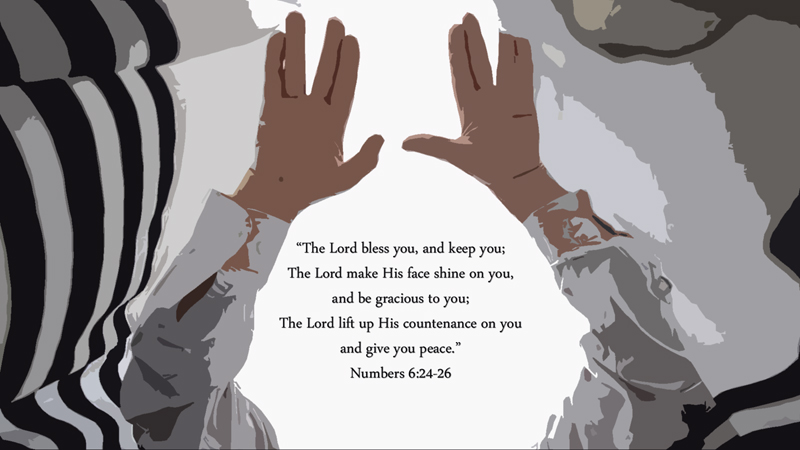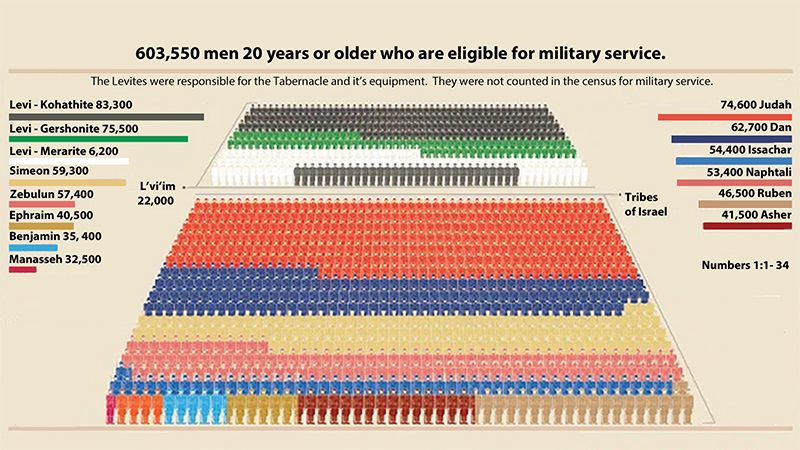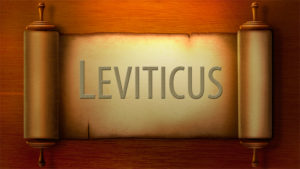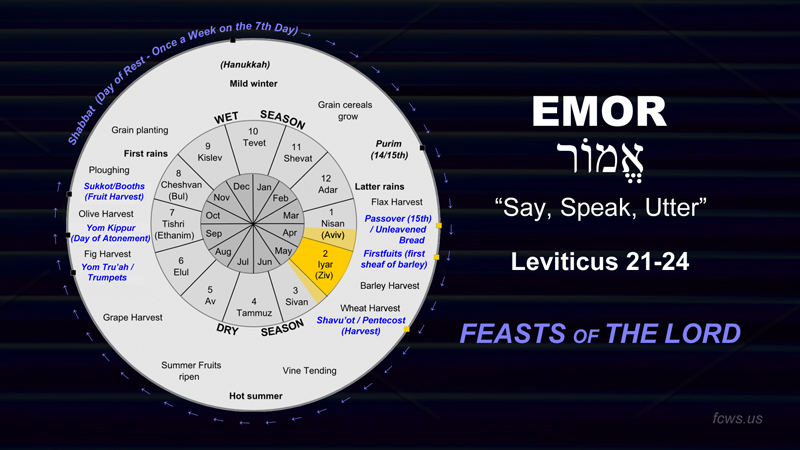 Israel has been at Mt. Sinai for almost a year. The Tabernacle had been constructed and God had indwelled it. Furthermore, God gave instruction on how to approach Him (Leviticus). Israel was about to set out to inherit the Land of Promise so God ordered that the men able to do battle be numbered. The small tribe of Levi was separated for the work of the Tabernacle. They became special servants to the priests in the place of the first-born sons of Israel.
Israel has been at Mt. Sinai for almost a year. The Tabernacle had been constructed and God had indwelled it. Furthermore, God gave instruction on how to approach Him (Leviticus). Israel was about to set out to inherit the Land of Promise so God ordered that the men able to do battle be numbered. The small tribe of Levi was separated for the work of the Tabernacle. They became special servants to the priests in the place of the first-born sons of Israel.
Each of the families of Levi was given specific assignment in handling the Tabernacle. The family of Kohath carried the vessels of the Tabernacle including the Ark of the Covenant, the Golden Altar, the Menorah and the Table of Showbread. The family of Gershon carried the curtains and the coverings of the Tabernacle. Finally, the family of Marari carried the structure of the Tabernacle. A total of 8,580 men were designated for these functions.
Can you imagine how these folks reacted early each morning as they opened their tents to see if the “Cloud” was moving? If so, they would have to disassemble the tabernacle and follow the “Cloud” wherever it went. If the “Cloud” was stationary, then they could rest from their duties.
In this section there are also specific commandments concerning a ritual exercised by the High Priest on behalf of a jealous husband who suspected his wife of adultery. I don’t remember reading anywhere where this procedure was actually utilized. There was also a commandment concerning a rebellious son. Again, I don’t remember reading that it was actually implemented.
If a person desired to consecrate himself/herself to God for a given period of time, he/she could make a “Nazirite” vow. For the period of time consecrated, the person was prohibited from (1) altering his/her natural appearance, i.e., they could not cut their hair or beard; (2) altering their minds with wine, strong drinks or even eating grapes; and finally (3) touching the dead. We have the Biblical record of men like Samson who was a lifelong Nazirite. I believe Samuel was also. In the gospels, John the Baptist was probably a lifelong Nazirite. We see Paul joining a group of men in Jerusalem who have made such a vow (Acts 21:23-26). The nearest practice that I am familiar with is the practice of fasting for a given period of time to draw near to the Lord.
The manner by which the “Men of God” interacted with God is of particular significance.
In Moses’ case we read,
“Now when Moses went into the tent of meeting to speak with Him, he heard the voice speaking to him from above the mercy seat that was on the ark of the testimony, from between the two cherubim, so He spoke to him.” (Numbers 7:89)
Moses was the first judge of Israel; Samuel was the last. Samuel’s experience was similar to that of Moses.
“And the Lord appeared again at Shiloh, because the Lord revealed Himself to Samuel at Shiloh by the word of the Lord.” (I Samuel 3:21)
Finally we believe that the same phenomena occurred to the prophet Elijah at Mt. Sinai.
“…and after the fire a sound of a gentle blowing. When Elijah heard it, he wrapped his face in his mantle and went out and stood in the entrance of the cave. And behold, a voice came to him and said….” (I Kings 19:12b-13a)
The actual expression used here for the Word of God is a “silent, small voice”. Every believer should recognize this “silent, small voice”. In the gospels, we read,
“And the Word become flesh, and dwelt among us, and we saw His glory, glory as of the only begotten from the Father, full of grace and truth.” (John 1:14)
Finally, included in this section is the special blessing by which God commanded that His people be blessed.
“The Lord bless you, and keep you; The Lord make His face shine on you, and be gracious to you; The Lord lift up His countenance on you and give you peace.” (Numbers 6:24-26)
Indeed, may the Lord so bless you today.
 This weeks Bible section reveals something about the relationship of believers from the nations with God and with Israel. The setting for this section is Mt. Sinai. Israel had been at Sinai for almost a year and was preparing to depart for the “Promised Land”. As they were being prepared to enter the land, God ordered that the men suitable for military service be numbered. Men from 20 years old were numbered. This speaks to the idea of an age of accountability. We believe that God ordered the men to be numbered to serve as a testimony to future generations and to assign responsibility to each individual.
This weeks Bible section reveals something about the relationship of believers from the nations with God and with Israel. The setting for this section is Mt. Sinai. Israel had been at Sinai for almost a year and was preparing to depart for the “Promised Land”. As they were being prepared to enter the land, God ordered that the men suitable for military service be numbered. Men from 20 years old were numbered. This speaks to the idea of an age of accountability. We believe that God ordered the men to be numbered to serve as a testimony to future generations and to assign responsibility to each individual. In the Bible, special occasions are built on periods of seven. This is the reason that the number seven takes on a special meaning. Usually this is interpreted as “divine completion”. Last week we saw the weekly pattern (Shabbat) and the monthly pattern: 1st month – Pesach; 3rd month – Shavuot; and 7th month – Sukkot. Shavuot occurs seven weeks after Pesach. Sukkot occurs seven months after Pesach. The Scripture section this week details the years being numbered in seven year periods for a Shabbat for the land. The land is not tilled but remains fallow in this year. Modern agriculture procedures incorporate this pattern to prevent the depletion of the soil. Finally seven periods of seven years (49 years) brings us to the “year of Jubilee” when the land returns to the family that it was originally allocated to. God declared that He owns the land and that the Israeli’s are “settlers” with Him (Leviticus 25:23). He also promised to walk in their midst (Leviticus 26:12). Because God declared that He owns the land, many today argue that it is sin to attempt to surrender sovereignty over any part of the land.
In the Bible, special occasions are built on periods of seven. This is the reason that the number seven takes on a special meaning. Usually this is interpreted as “divine completion”. Last week we saw the weekly pattern (Shabbat) and the monthly pattern: 1st month – Pesach; 3rd month – Shavuot; and 7th month – Sukkot. Shavuot occurs seven weeks after Pesach. Sukkot occurs seven months after Pesach. The Scripture section this week details the years being numbered in seven year periods for a Shabbat for the land. The land is not tilled but remains fallow in this year. Modern agriculture procedures incorporate this pattern to prevent the depletion of the soil. Finally seven periods of seven years (49 years) brings us to the “year of Jubilee” when the land returns to the family that it was originally allocated to. God declared that He owns the land and that the Israeli’s are “settlers” with Him (Leviticus 25:23). He also promised to walk in their midst (Leviticus 26:12). Because God declared that He owns the land, many today argue that it is sin to attempt to surrender sovereignty over any part of the land.